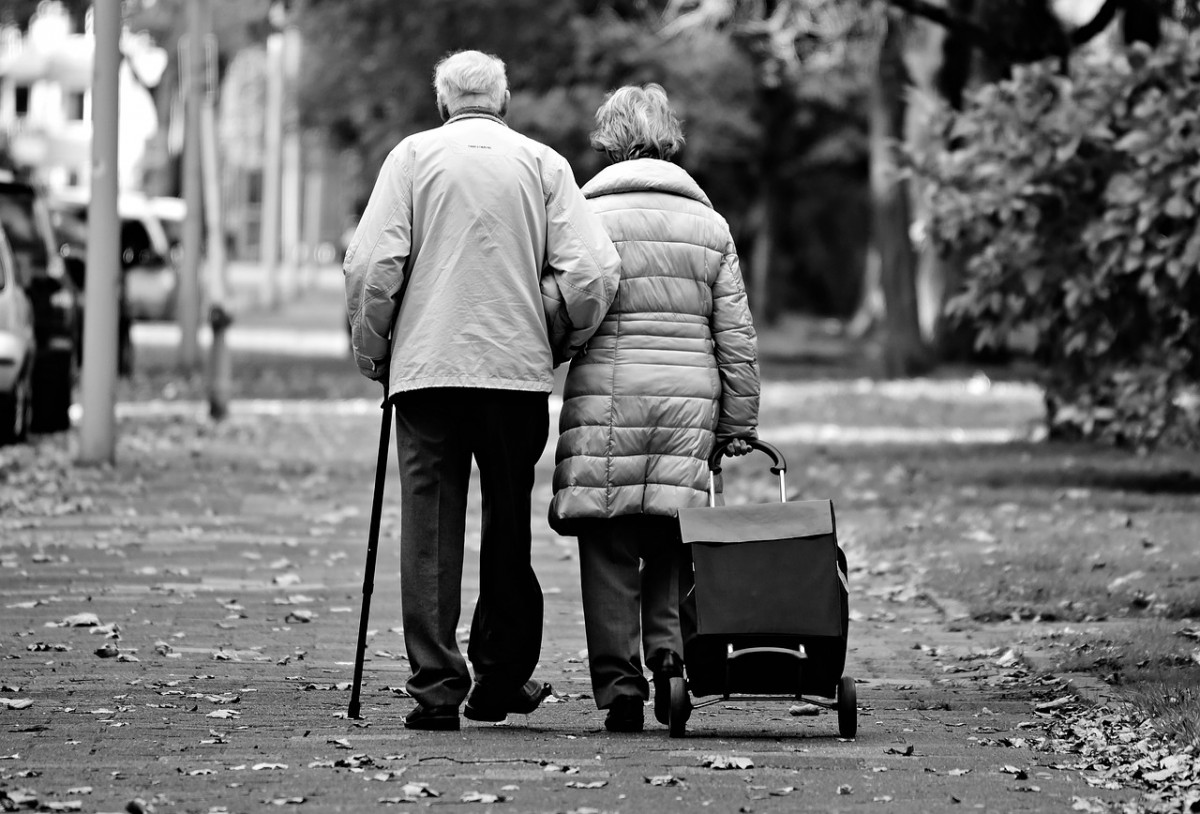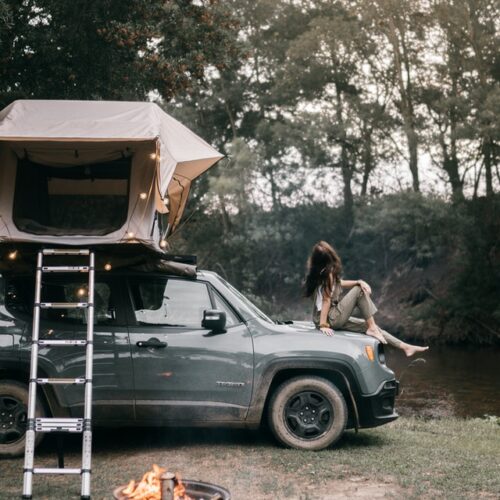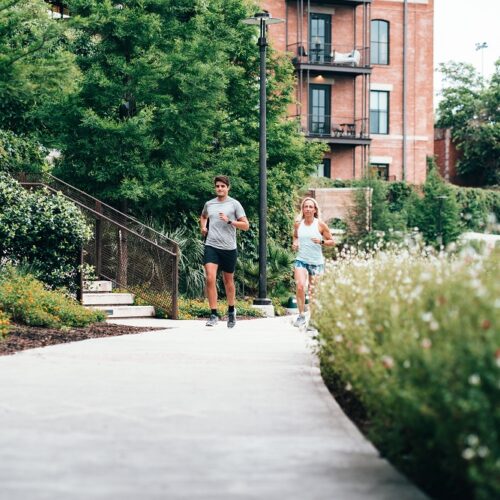If you have suffered a fall in the past or have become a little unsteady it’s only natural to worry about what will happen if you fall and no one is around. Falls and fractures are a serious health issue and extremely costly, both to the NHS and more importantly to the individual themselves.

Some older people will never fully recover from a fall, suffering from distress, pain, injury and loss of confidence. Falls at night can be particularly dangerous and hypothermia is a risk during the winter if you fall and can’t get back on your feet.
There are however several ways you can safeguard yourself against potential falls with some forethought, such as a fall alarm, more regular exercise or being more conscientious about your environment at home.
Improve your strength and balance
Activities that improve muscle strength in your legs, arms, back, shoulders and chest are particularly important as you get older. They can make it easier to get out of a chair and, because they improve your posture, also improve co-ordination and balance, making it an effective way to reduce the risk of falling.
Moving about more often also strengthens your legs and makes you less prone to falling.
These activities will help your strength and balance:
- Use the stairs frequently.
- Slowly and repeatedly rise to a standing position from a chair.
- Walking, badminton, dancing or yoga.
- Special strength and balance exercise classes, tai chi or exercise to music.
Eye care
Glasses fitted with bifocal or varifocal lenses can make objects and surfaces appear closer than they really are. This could cause you to trip or lose your balance, particularly on stairs. Ask your optician for advice.
Get your eyes checked and your prescription reviewed as often as your optician advises, and at least every two years. Have a regular eye test, even if you think your sight is fine, as opticians can detect eye conditions at an early stage. NHS eye tests are free once you reach the age of 60.
Manage your medicines
Certain medicines, low blood pressure or poorly controlled diabetes can make you feel faint or dizzy. Let your GP or pharmacist know if you ever feel like this – they may need to check the dose or look at alternative medicines.
Alcohol can interact with some medicines and can affect your balance too. Check the leaflet that comes with your medicine for possible side effects.
If you are a PPP Taking Care Personal Alarm customer, you can add our medical helplines to your service to get expert support from qualified nurses and trained pharmacists who will answer any questions you may have about your medication.
Look after your feet
Problems with your feet can stop you getting out and about. They can also affect your balance and increase the risk of falling, so it’s important to report problems such as foot pain or decreased sensation in your feet to your GP or practice nurse.
If you have arthritis, you may find that trainers or well cushioned shoes are more comfortable than ordinary shoes and offer better support. But make sure the soles aren’t too thick, as you could feel unsteady if you can’t feel the floor beneath your feet.
- Wear shoes that fit well. High-sided shoes with low heels and thin soles with a strong grip are a good choice.
- Avoid wearing sandals and shoes with high heels.
- Wear slippers with a good grip and that fasten up. Loose or worn out slippers may cause you to trip.
- Make sure your trousers or skirts don’t trail on the ground.
- Always wear shoes or slippers. To avoid slips, don’t walk indoors in bare feet, socks or tights.
Checking your home environment
Look out for things around your home that could cause you to slip, trip or fall. Although some of these points may seem obvious, it’s surprising how often they can be overlooked – so it’s worth checking them.
- Do you have good lighting, particularly on the stairs?
- Do you have a nightlight in the bedroom or a torch by the bed in case you need to get up in the night?
- Are floors clear of trailing wires, wrinkled or fraying carpets, or anything else that you might trip or slip on?
- Are stairs and steps free of clutter?
- Do you have handrails on both sides of the stairs?
- Do you have a non-slip mat and a fitted handrail in the bath?
- Do you have non-slip mats under rugs?
- Does your pet wear a collar with a bell on? Pets can get under your feet, so be aware of where they are when you’re moving about.
- Do you rely on a stepladder to reach high places? Always ask someone to help if you’re using a ladder and never stand on a chair.
- Is your garden path clear and free from moss? Watch out for uneven paths and slippery surfaces as well. Carefully placed handrails and posts can be helpful if you need them.
A safe home assessment will highlight any trip hazards and provide recommendations.
Tackling the fear of falling
We all stumble or trip sometimes, but the fear of falling can start to become a serious worry and can be quite difficult to deal with if not addressed quickly. Don’t give up on your physical activities because you’ve had a fall, if you feel confident enough to keep doing them. The anxiety may stem from having had a fall already, but it can play on your mind even if you haven’t fallen before.
This sometimes happens after a period of illness, which can leave you feeling weak and a bit unsure of yourself. As a result, you may become more cautious, limit what you’re willing to do, and lose confidence in carrying out daily tasks and activities. You may even stop wanting to go out on your own. Worrying in this way isn’t unusual, but it can make you anxious, isolated or depressed. Fears about losing your independence can also make you reluctant to seek help. Perhaps you’re worried that people will think you’re unable to look after yourself properly, or that they’ll suggest you move into a care home. It’s important not to let such thoughts stop you from getting help.
A fall alarm can give you, and your family, the confidence that you can get help should you fall when there is no-one around. Our fall sensor is a lightweight device worn around the wrist or around the neck and automatically calls our 24/7 response centre when it detects you have fallen. The sensor will vibrate and the LED indicator will flash red if it is about to raise an alarm, reassuring the wearer that help is on the way if they are unable to communicate. If it is a false alarm, the wearer has time to cancel it by pressing the button on the fall detector. Otherwise it will contact our response team who will take appropriate action by calling the wearer’s keyholders or emergency services.
With PPP Taking Care, you can add fall alarms and other sensors to work alongside your personal alarm service. Our personal alarm services help over 51,000 people stay in the homes they love. We offer 24/7 help at the touch of a pendant or alarm unit, plus a medical support line staffed by qualified nurses. We also have pharmacists on hand to answer questions on pills and prescriptions.
Featured Post
© Copyright 2019 Antonia, All rights Reserved. Written For: Tidylife


Leave a Reply